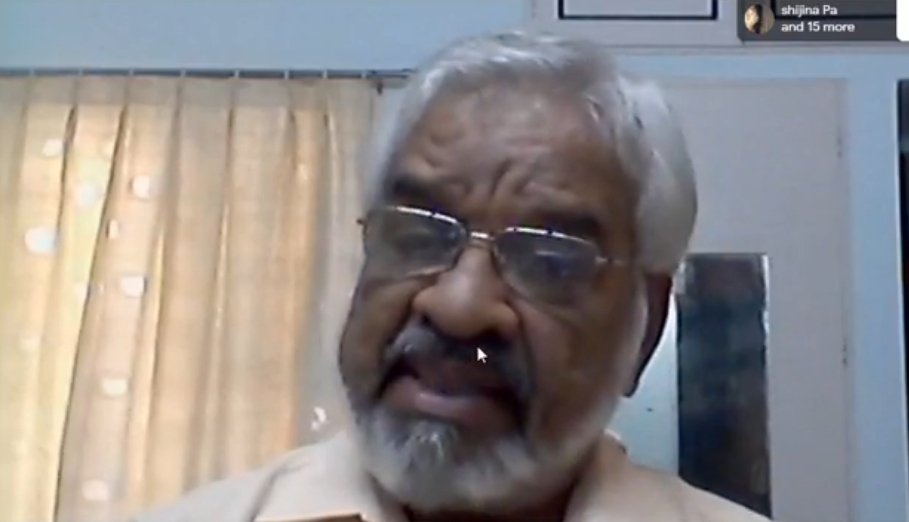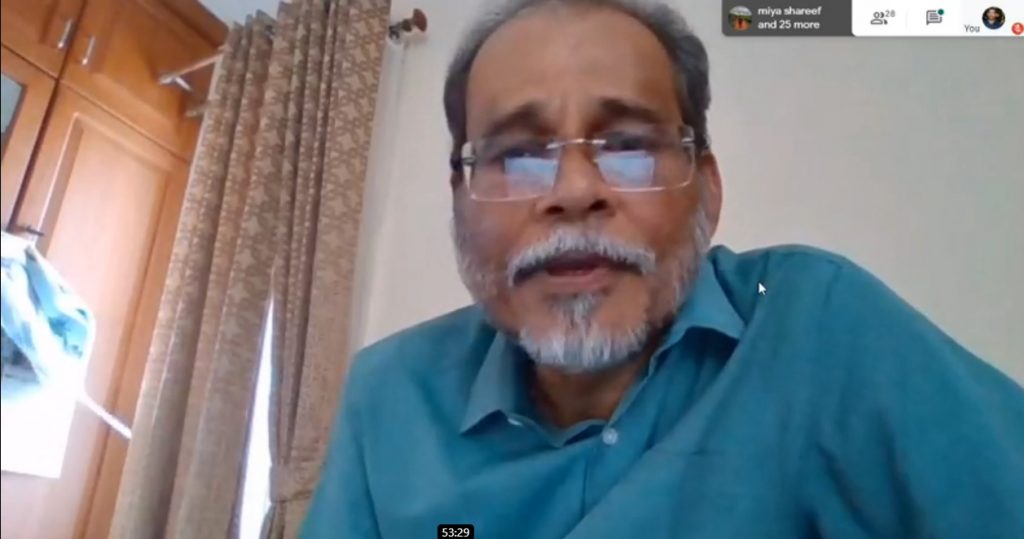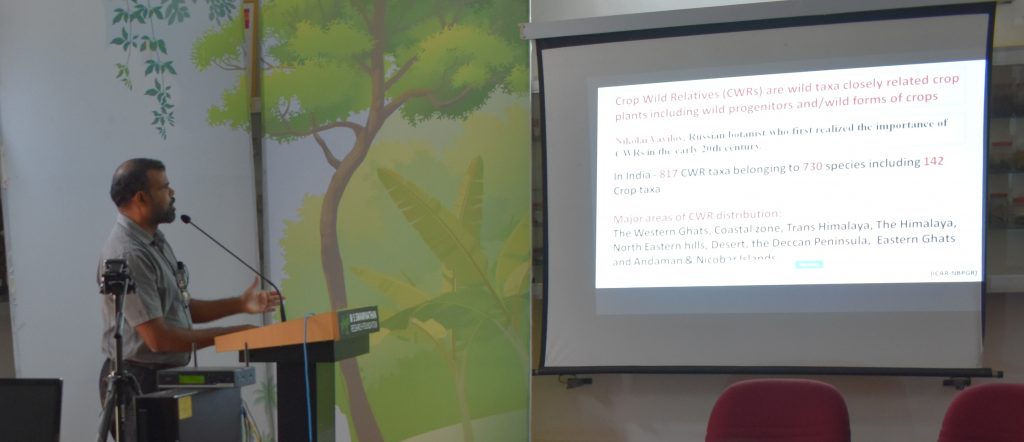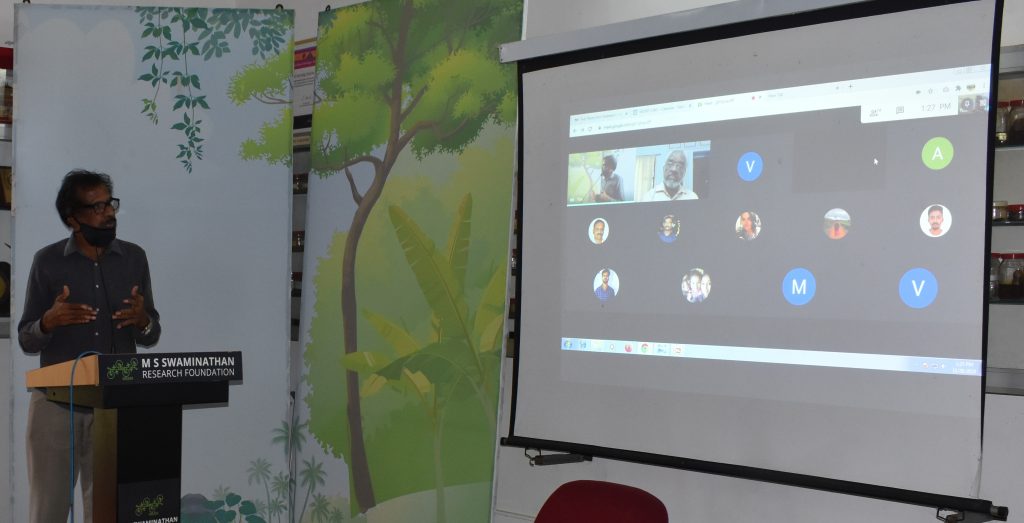The first Webinar in the MSSBG Webinar Series was conducted on 28th November 2020. Dr.V. Shakeela, Director, CAbC-MSSRF delivered the welcome speech and Dr N. Anil Kumar, Senior Director, MSSBG introduced the speakers and facilitated the Webinar.

The Webinar Series was inaugurated by Dr M.C. Dathan, Scientific Advisor to Chief Minister of Kerala and former director of VSSC. He delivered his speech on ‘Emerging Trends to Conserve Biodiversity’ and has added that we have a great responsibility for sustaining the life system of the planet. He presented the example of multiplying the vegetation of Sreeharikota Campus with the help of Yenadi tribal community.
He pointed out the importance of protecting every crop varieties and appreciated the effort taken by MSSBG for the sustainability of rare plants. He also added the importance of educating the young generation to maintain the ecosystem to mitigate climate change.

Dr B. Venugopal, Honorary Director, Centre for Intangible Heritage Studies, Sree Sankaracharya University of Sanskrit, Kalady joined the panel by taking up a session on ‘Biocultural Diversity Community Protocol as Applicable to Intangible Heritage’. He explained the relation between Biocultural diversity and various domains of Intangible Heritage. He added that Biocultural community protocols (BCPs) are instruments that set out clear terms and conditions to governments and private, research and non-profit sectors for engaging with indigenous and local communities (ILCs) and accessing their local resources and knowledge. Nagoya protocol is the first internationally binding acknowledgement of community protocols. One of the best practice examples of ABS issue from India cited globally, is the Kani tribe and their TK relating to the use of a plant called ‘Arogyapacha’ where the local communities were recognized and rewarded for providing the genetic resource and associated TK that resulted in the commercialization of a drug with anti-fatigue properties called ‘Jeevani’. The Kerala Kani Samudaya Kshema Trust (KKSKT)received the first Equator Prize in 2002 as a case study of access and benefit-sharing regime at the local level and has demonstrated both the challenges to implementation of this idea and its potential to positively impact local communities. This is the best example of bringing the knowledge system in cultural heritage and Indian model on Intangible Heritage. Presently, their institution is working on the intangible knowledge heritage system of the Kadar community which is the first attempt from India to include the fourth domain of the UNESCO RL of the Intangible Cultural Heritage (RLICH). He suggested that MSSBG can also come with similar projects in Kattunaikka community as the centre is focused to community agrobiodiversity.

Later, Mr V.V. Sivan, Senior Scientist, MSSBG spoke about the ‘Importance of conservation of wild crop relatives’. He pointed out that India is among the 12 Mega Diversity Centres of the world and naturally the Crop Wild Relatives (CWR) diversity is also very high in India. In India, there are 817 CWR taxa belonging to 730 species including 142 crop taxa. The Western Ghat is the origin of Black pepper, Jack and small cardamom and it also harbor very high genetic diversity of CWR genera. There are 250 CWRs reported from Kerala among which 100 are endemic to the Western Ghats and 24 to Kerala. CWRs are potential source of many traits such as resistance to disease and many stresses. He projected the examples of wild rice (Oryza nivara), wild lady’s finger (Abelmoschus tuberculatus), wild mung (Vigna radiata var. sublobata). He added that deliberate attempt is required for the conservation of CWRs in Ex-situ mode in all Biogeographic zones.

Dr N. Anil Kumar gave concluding remarks on strengthening MSSBG’s partnership with the community. He added that MSSBG will synergize the traditional knowledge and modern wisdom and also this garden will facilitate the benefit-sharing mechanism. Moreover, wild crops should not be considered only as a breeding source, it is also a nutrition source for the community. Later he gave the vote of thanks to the speakers and the gathering.
Winners of the NOVA butterfly photo contest was also announced in the webinar and they are;
First place: Mrs. Deepthi Sunjith, Kannur
Second Place: Dr. Bommireddy Thirupam Reddy, Jharkhand Third Place: Mr. Anand Subhag Madhavan, Kannur
